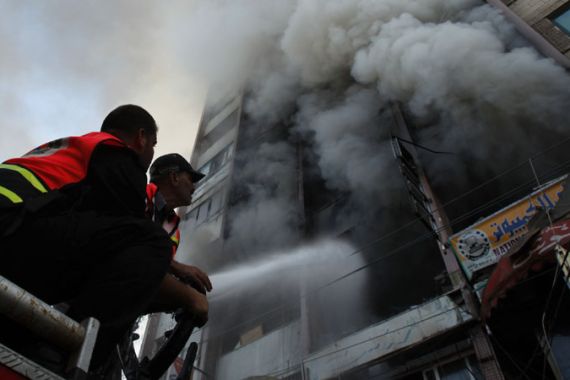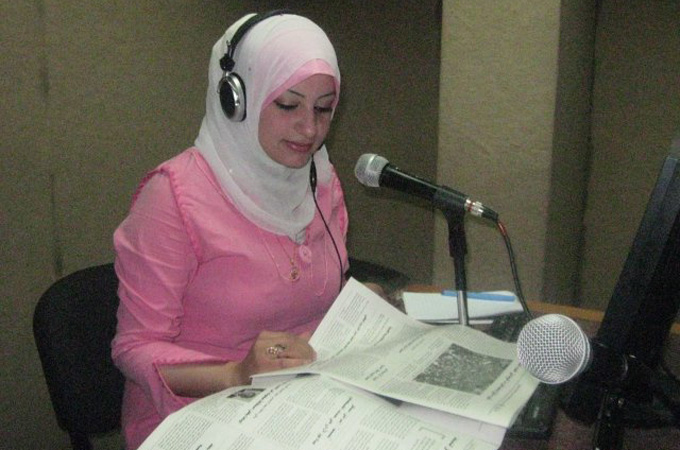Gaza journalists gain experience under fire
For four female journalists from Gaza, covering the Israeli assault on the coastal enclave was business as usual.

Gaza City – As the missiles rained down, journalist Wafaa Abu Zareefa received a text message from the Israeli army, warning her to stop her coverage.
Mobile phone messages were also sent to other Gaza-based reporters with similar threats, and orders to evacuate their homes during Israel’s eight-day military onslaught on the coastal enclave last month.
Dubbed “Operation Pillar of Defence” by Israeli officials, the air strikes targeted several media offices, killing three journalists. The Israeli military also issued a “warning” to reporters in Gaza, telling them they should avoid any contact with Hamas representatives.
Abu Zareefa is one of four female journalists who reported on the assault – and its Palestinian victims – who recounted their experiences to Al Jazeera.
Though Gaza is a hotbed for career advancement for international journalists, the world rarely gives a second thought to local Gazan journalists, and even less so if they are women, they say.
Abu Zareefa, 33, is the director of the Aseel Media production company, and a media trainer. She also works for Radio Dream in the West and Radio Minbar al-Hurriyeh. She says despite the dangers and bloodshed, the experience of the latest Gaza attack has made her a better reporter.
|
“I wanted a cease-fire before this but when they were killed, I didn’t want one anymore.” – Wafaa Abu Zareefa, journalist |
“It was incredibly difficult witnessing firsthand the carnage, but from a professional viewpoint, the experience honed and developed my skills,” Abu Zareefa says.
Two cameramen from Al Aqsa TV channel – Mahmoud al-Koumi, 29, and 30-year-old Husam Salameh – were killed when an Israei air strike targeted their car. According to Al Aqsa, the vehicle was clearly marked “TV”. Some of Abu Zareefa’s colleagues broke down in tears and anger upon learning of the deaths, which she says made it hard to be an unbiased journalist.
“I wanted a cease-fire before this but when they were killed, I didn’t want one anymore,” she says flatly.
Covering the attacks took a toll personally, Abu Zareefah says. Once the Egypt-mediated cease-fire was announced on November 22, Abu Zareefah didn’t go to work for a few days, citing exhaustion and burnout.
“One thing that got me going was the support from the Palestinian journalists in the West Bank,” she says. “They were incredibly supportive and always available.”
‘Targeting’ journalists
“[Targeting journalists] has always been in the context of Israel obscuring what it does on the ground during its military operations,” says Samir Zaqout from the Al Mezan Center for Human Rights.
“When Israel realised that the reaction from the resistance was particularly strong, it felt incumbent upon itself to take revenge by targeting civilians and preventing journalists to cover its assaults, and the truth of what was happening on the ground – the same tactic used in Operation Cast Lead in 2008-2009.”
The Israeli military said the attacks on media buildings were “surgical strikes” on Hamas’ communication devices located on the buildings’ rooftops, and accused the group of using reporters as human shields to try to protect their operations.
Mark Regev, a spokesperson for the Israeli government, told Al Jazeera that “[Israel] does not target journalists. We target Hamas”.
Rawan al-Katari, 26, is a coordinator for the media department at the Polytechnic Institute in Gaza. She hosts radio shows and writes for a number of different news outlets. Al-Katari also covered Israel’s 22-day “Operation Cast Lead”, but said the latest fighting was different.
“I was really shocked by the intensity of this war,” al-Katari tells Al Jazeera. “During Cast Lead I felt safer because I was living with my family, even though they are in a dangerous zone … But now that I am married and a mother to two daughters … the concern and fear for the lives of my loved ones was doubled.”
 |
| Rawan al-Katari during a broadcast [Al Jazeera] |
Al-Katari describes how every time she left for work in the morning, she broke down in tears saying goodbye to her husband and young daughters.
“My biggest fear was that when I’d go to the Shifa Hospital [the largest in the Gaza Strip] to document the number of injuries and deaths, I’d find my husband and daughters amongst the victims. Every child patient I interviewed, I’d be forcibly reminded of my two girls.”
Her husband, a Palestinian Authority employee, did not prevent her from going out to cover the story because they both recognised it was an obligation to document the Israeli attacks. Al-Katari worked mostly in the field from hospitals, the streets, and at the scene of demolished houses.
One of the most harrowing scenes she witnessed was during the third day of “Operation Pillar of Defence” from inside Shifa Hospital. A young man was mourning the death of his fiancé – two days before their scheduled wedding. He was completely inconsolable with grief, Al-Katari says.
She, too, admitted the stress and psychological trauma took its toll.
First time covering war
Rita Isaac, 27, is a TV reporter for the Beirut-based Assia channel, and a director of documentary films. She began her work in journalism in 2009, and this was her first experience as a war reporter under fire.
“The first three days of the attacks I’d work from the morning until midnight for round-the-clock coverage,” Isaac recounts. “The days after that I’d go home after 9pm. My brother, who is a doctor at Shifa Hospital, didn’t come home once during the eight days.”
Her family feared something bad would happen to her, but recognised this was her job and did not stand her in way. Her male colleagues took exceptional care of her, and treated her like a sister, Isaac says.
“The sound was unbelievably loud and frightening,” she says, remembering a series of air strikes. “I completely froze and my mind and body felt like they could not function anymore. One of my colleagues threw me on the ground to avoid being hit by shrapnel.”
|
“It was 24-hour coverage and I had other people working shifts with me, but I still barely got two hours of sleep every day.” – Mariam Hamed, Palestinian Journalist Network |
Two experiences continue to haunt Isaac. One was witnessing a missile as it traveled through the air and slammed into the Ni’meh building, which houses the Agence France Presse headquarters in Gaza.
Majdi Naim, a family friend and doctor at the Shifa Hospital, was called to treat the victims. He found out upon his arrival that it was his son who had been killed in the air strike, Isaac says.
She also reported on the collapse of a building in which nine members of the Dalou family were killed, including four children between the ages of one and seven.
“I saw the bodies of the Dalou family as they were being pulled from beneath the rubble. The most difficult moment for me was seeing a girl’s hand pulled from the rubble, but the rest of the body was missing. A few days later, rescue teams finally unearthed the body,” Isaac says.
Mariam Hamed, 28, is the manager of the 1,400-member Palestinian Journalist Network, or PJNET. Her work mostly involves social networking and electronic media.
“This was a media war,” Mariam says. “I would send tweets in Arabic and English to Israeli officials and the IDF spokesperson account on Twitter, contradicting their claims with facts and eyewitness accounts and photos. It was 24-hour coverage and I had other people working shifts with me, but I still barely got two hours of sleep every day.”
Mariam lives next to the Ansar building, one of Hamas’ security complexes, so the missile strikes were intense in her neighbourhood.
“With every air strike in the area, the whole house would swing. My fiancé is in London and begged me to leave and go to Egypt until it was all over. But I refused from the very beginning,” she says.
Israelis would send her messages on Facebook in poorly translated Arabic, cursing and threatening her, but Hamed says it never dissuaded her.
“I still dream of the air strikes,” she admits, “but silly messages on Facebook do not bother me. My message to the international community would be to support Palestinian local journalists in every way they can.”